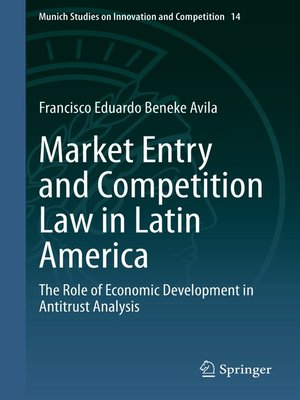Market Entry and Competition Law in Latin America
ebook ∣ The Role of Economic Development in Antitrust Analysis · Munich Studies on Innovation and Competition
By Francisco Eduardo Beneke Avila

Sign up to save your library
With an OverDrive account, you can save your favorite libraries for at-a-glance information about availability. Find out more about OverDrive accounts.
Find this title in Libby, the library reading app by OverDrive.



Search for a digital library with this title
Title found at these libraries:
| Loading... |
This book explores the relationship between market entry analysis in competition law and the study of the determinants of aggregate investment. Macroeconomic and social characteristics, such as widespread corruption, political instability, and low levels of education are associated with lower investment rates. Progress on these indicators on the other hand is also strongly associated with sustained growth and higher investment rates. This book analyzes the interaction between these macro variables and the market-specific analysis typical in antitrust cases. Against this background, representative decisions of four Latin American competition authorities – México, El Salvador, Colombia, and Chile – on unilateral conduct are analyzed, focusing on market power assessment. The analysis shows that there is little to no explicit or implicit consideration of the impact of the macroeconomic environment on market dynamism and therefore on market power. This book also explores the influencethat EU and US competition law have in the standards to prove ease of market entry developed by the Latin American authorities. Although most of the Latin American authorities share a lack of reliance on market forces, which is characteristic of EU competition law, this book argues that market entry analysis still needs to be adjusted to fit the socio-economic context that affects investment within the country and the degree to which each particular market is affected. Finally, the book proposes a framework on how the macro characteristics covered can be incorporated into competition law enforcement.






